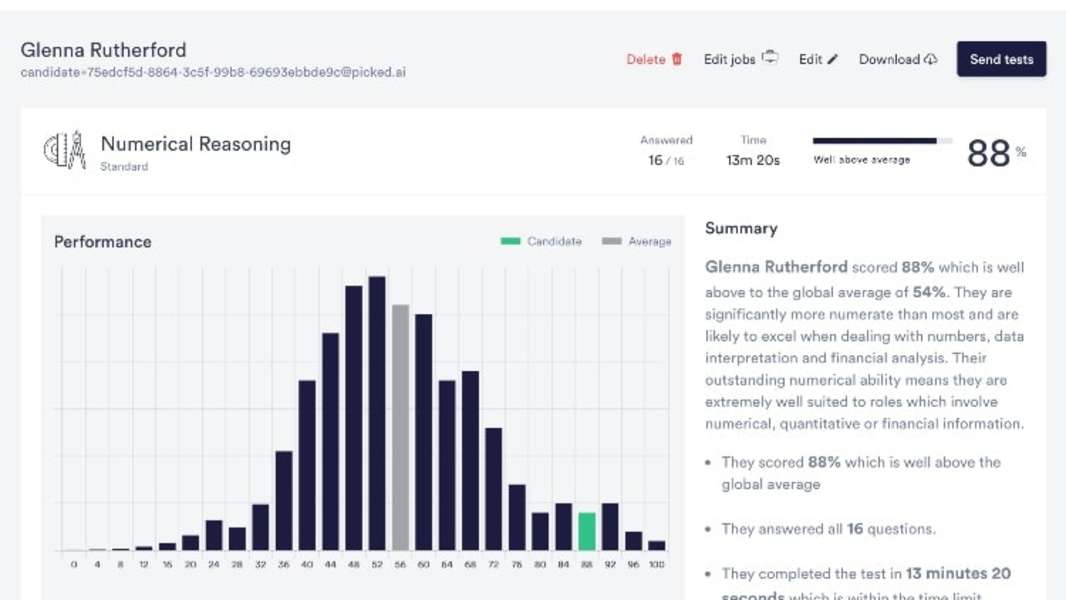What are pre-screening tests?
Pre-screening tests are useful during recruitment to help streamline the application process, ensuring that the best candidates are taken forward to interviews and the next stages.
Pre-employment screening offers recruiters and employers useful information in the form of objective data points that can be used as scoring criteria. This can help reduce a candidate pool from potentially thousands of applicants to a much more manageable number to go through to interviews.
Choosing the right pre-screening tests makes a positive difference in the hiring process for the business in terms of saving time and money, and also for the applicant, improving their journey and overall experience - but there are some pitfalls to pre-screening tests that need to be avoided to ensure that you are getting the best results from them.
Common hiring mistakes during pre-screening tests
1. Removing human decision making
The automation of the recruitment process is simple - and it can lead to complete removal of any human decision-making. This can help to reduce unconscious bias in hiring, but it can also be problematic as in a workplace that is defined by data and algorithms, we might forget about human strengths and issues like transparency, power, social control, and accountability.
Using pre-screening tests in addition to human interaction and other criteria makes sure that businesses are not reliant on technology to make decisions for them.
2. Relying only on data
Automation is amazing, and data is everything. Objective data in the form of information gathered about a candidate through a pre-screening test is valuable, but it is not the only data that you should be using.
The most rounded way of using data like this is to consider it in conjunction with subjective information, like education, personability, qualifications, and interview results. Tests should not be considered the only way to assess a potential candidate, but should instead be used as a tool in the recruitment toolbox.
3. Not accounting for neurodiversity
Most pre-screening tests are considered to offer a level playing field for candidates, where every applicant is presented with the same questions to get a score that can be compared to others.
However, there have been reported problems with pre-screening tests not taking into account the different needs of applicants that might be disabled or neurodivergent. As corporate inclusion policies consider more and more the needs of employees who might be considered neurodivergent or disabled, reasonable adjustments must be made even at the pre-screening stage.
4. Choosing the wrong tests
All tests that employers use throughout the recruitment process must be job-related. All of the tests need to be validated - which means that they need to be rigorously tested to prove that they are reliable indicators of performance.
The validity of the aptitude test is only as useful as the test suitability, so when deciding on the pre-screening tests that are used in the recruitment process, think about what skills, attributes, personality, and behavioural traits that are needed in the role. An admin assistant might not need to complete a mechanical comprehension assessment, and a warehouse worker is likely to not need to complete a typing test.
5. Creating an impersonal experience
Taking tests is usually quite stressful for a candidate, and relying on automation and taking the human element out of the recruitment process can create a rather impersonal experience for the people that are applying.
Applicants want to know that there is a human (or a team of humans) behind the tests that they are taking.
6. Using only one test
While recruiters might be inclined to reduce the test burden on applicants by reducing the number of tests that they need to take during pre-screening, it is not a great idea to rely on just one test.
There are any number of pre-screening tests that can make a difference to your recruitment process, so do not rely on just one if you want to be sure that you are taking forward the best candidates.
7. Over-automating
Technology is a wonderful thing, and every moment there seems to be a new piece of AI or algorithmic software that is aimed at improving the recruitment process.
Employers and recruiters must remember that pre-employment screening tests are not crystal balls, and over-automating the application process has a risk of relying on that technology to make decisions.
Automation can make a real difference in reducing the cost of the recruitment process, both in time and financially, but over-automating is a mistake that should be avoided.
8. Ignoring candidate experience
The push to make the application process more streamlined and automated can be beneficial to both the business and the applicant. However, it is important to remember that most people do not enjoy taking tests, and in many cases, pre-employment screening might be the first proper interaction that the candidate will have with the company.
Candidates will discuss the process with other people, and a positive experience is likely to be more engaging for the applicants who will want to share that experience with their family and friends. Think about finding the right balance between tests, interviews, and other information such as experience and qualifications to create a good candidate experience.
9. Ignoring risk factors
Pre-employment screening tests are considered valid because they predict future success, but instead, it might be better to think of them as predicting risk factors or failures.
The scores that applicants get on pre-employment screening tests should be used in conjunction with other criteria. Other things are known to be predictors of success in a job role, such as experience and education, personal values, and motivation - so it is a risk factor to look at test results in isolation.
10. Ghosting applicants
With the increase in rather impersonal automation, it is quicker to sift through potential employees and find the top performers - but this can lead to a hiring mistake of applicants feeling 'ghosted' when their application is not taken further.
At every stage of the process, keeping in contact will make sure that every applicant feels positive about their experience, even if they are not successful.
Plan for success
To be successful in using pre-employment screening tests, the first consideration should be whether the tests used are necessary and appropriate. Whenever automation, algorithms, and AI are used in the recruitment process, it is important not to ignore the human factor.
Candidate experience and efficient applicant processes can be achieved by finding the right balance between tests, interviews, and data from the CV and cover letters, like experience and qualifications.









